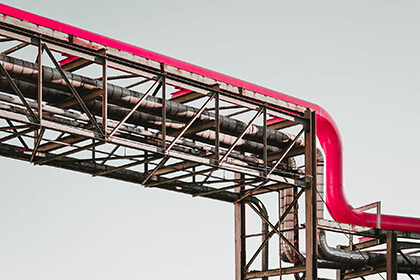Whether your company is a brand new start-up or an established business in the process of moving premises, it's important to familiarise yourself with your business's projected utility costs and how you can reduce this liability as much as possible.
Whilst business utilities' per unit prices are generally cheaper than domestic rates, ultimately, business energy bills are a lot more expensive.
As business utilities cost so much more, are heavily taxed and prices fluctuate, obtaining competitive quotes and negotiating favourable terms for a new commercial energy contract is a vitally important job that can be time-consuming and complex.
That's why it's imperative you seek professional help and guidance from a business utilities' expert to source the best deals and prices for your business.
If you haven't changed utility providers for several years, you could save your business up to 60% by switching providers with the professional assistance of a Complete Business utilities’ expert.
Complete Business has access to and can provide you and your business with the most competitive quotes from a top assortment of trusted energy suppliers.

Business Broadband
Save money on your business broadband by comparing quotes with Complete Business. We do the hard work for you.

Business Electricity
We can compare, find and switch your business to a better deal for your business electricity from our panel of well known business energy suppliers.

Business Gas
We find and compare the latest business gas rates available in the UK to get the best deal for your business.

Business Phone
Discover business phone package deals and save money for your business by switching contracts.

Business Water
Our team of experienced agents will help you save money on water for your business premises.
You should be able to switch to a new business energy supplier if you're not tied in to a contract or you're on a 'default' or 'deemed' tariff. If you think you should be able to switch but your supplier refuses to allow this, contact Citizens' Advice.
What classes as a business utility?
The following are classed as the most basic, mainstream types of business utilities UK that almost all businesses require to function and run:
Additional types of business utility services that more loosely fall under the umbrella of 'business utilities' are:
Did you know that if your business falls into debt with your business energy supplier, you could be disconnected within 30 days, charged a disconnection fee and will need to pay another fee to be reconnected?
What can affect your business energy quote?
Seeking out the very best commercial energy supplier and deal for your particular business is not straightforward and is definitely not something that you can easily achieve using bog-standard, business utilities comparison sites.
So knowing what can affect a business energy quote can help you (or one of our experts help you) negotiate and understand the terms of a convoluted energy contract.
Here's what can affect your business energy quote and ultimately, the cost of your business utility bills:
Wholesale energy prices
Many commercial energy providers will only purchase electricity and gas after a contract has been agreed, i.e. if your contract term is 3 years then the supplier will buy sufficient energy to cover those 3 years. This means that any increased cost in wholesale energy prices, at the time of renewal or inception of a new contract, will be passed on to your business.
Industry type, size and consumption
The type and size of business you run will of course have a huge impact on your projected business energy usage, energy quote and bills.
The biggest energy-sapping businesses in the UK are in the travel and transport industry (using a colossal 40% of all commercial energy in 2018), followed by the manufacturing industry, supermarkets, convenience shops, high street retailers and office-based businesses.
If your business is one of these energy-guzzling types of industry, you can expect a higher quote due to pollution penalties.
However, instructing one of our commercial energy experts to seek quotes and negotiate contract terms on your behalf, including seeking any relief or exemptions applicable to your business (see levies, reliefs and schemes below), will ensure you get the best deal possible.
There is good news for smaller businesses seeking energy quotes, who meet certain criteria relating to their usage, size and income.
Thanks to Ofgem's Retail Market Review, micro businesses are able to get much fairer deals from suppliers as long as they only:
- consume 293,000kWh or less of gas a year
- consume 100,000kWh or less of electricity a year
- have 10 or fewer employees (or their full-time equivalent) and
- have a turnover of less than 2 million Euros (approximately £1.7 million)
In fact, many suppliers have included all Small and Medium-Sized Enterprises (SMEs) in their microbusiness policies which can include:
- a back-billing limit
- a rollover limit or no rollover terms at all
- transparent invoicing and end dates
- clearer terms and conditions
- a 14-day cooling-off period
Energy Type
Gas is much cheaper than electricity, so if you only have an electricity supply at your business premises, you'll have to pay more than a premises benefiting from both a gas and electricity supply.
Also, business energy providers separate gas and electricity supplies and bills; there is not a dual fuel bill option like there is for domestic properties meaning you'll have completely separate tariffs for each type of fuel.
The average annual business gas cost for a:
- microbusiness is £400 - £820
- small business is £820 - £1,458
- medium business is £1,458 - £2,239
The average annual business electricity cost for a:
- microbusiness is £900 - £2,244
- small business is £2,367 - £3,660
- medium business is £3,774 - £7,234
Source: moneysupermarket.com
Geographical location
Where your business is situated will also affect the unit cost of your electricity and gas.
For example, on average, Merseyside and South Wales have the highest energy prices and North Scotland or the East Midlands have the lowest. So the postcode for your business will affect your quote. Source: uswitch.com
Credit score and debt
Businesses with a poor credit rating will have a limited choice of suppliers; some suppliers will decline the custom of a business with bad credit or will not allow a business with bad credit access to their cheapest deals.
If your business has a low credit score then you should do all that you can to try and increase your score before switching suppliers and negotiating a new energy contract.
Source: businessjuice.co.uk
Contract terms and length
Unlike domestic energy contracts where options are somewhat limited, commercial energy contracts offer much more flexibility and their terms and length are fully negotiable, meaning a contract can be tailored to suit your business needs.
Letting one of our experts negotiate your business utility contract on your behalf can save you hundreds of pounds and get your business a much better deal, potentially saving hundreds if not thousands of pounds in energy costs.
Payment Method
Most suppliers will offer a discounted quote if you choose to pay your utility bills by monthly or quarterly direct debit, although this will only slightly affect your business utility quote.
VAT
Your business energy quote will be significantly bumped up by VAT as commercial energy customers are charged a whopping 20% VAT, whereas domestic energy customers only pay 5% VAT.
Levies, reliefs and schemes
There are environmental taxes and levies on certain types of businesses with high energy consumption but your business may equally be entitled to reliefs or even be exempt from certain taxes if:
- your energy consumption is high due to the nature of your business
- your business is small and does not use much energy
- your business buys and uses energy-efficient technology (you can claim capital allowances if so, thus also saving money by reducing your tax liability)
Your business may be subject to the Climate Change Levy (CCL) if it's in certain sectors such as:
- Industrial
- Commercial
- Agricultural
- Public services
Or, if your business is a large, non-energy intensive organisation, it may be covered by the CRC Energy Efficiency Scheme (formerly known as the 'Carbon Reduction Commitment').
The types of business usually affected by this scheme are:
- hotels
- supermarkets
- banks
- water companies
- local authorities and state-funded schools
- all central government departments
Another scheme called the 'EU Emission Trading System' (EU ETS) allows energy-intensive sectors - like certain manufacturers and the energy industry itself - to buy and sell greenhouse gas emission allowances to reduce a business's environmental impact.
If you'd like to reduce your business's carbon footprint as part of your business energy management, then speak to one of our specialist advisers.
You can also get a tailored quote for your business from one of our commercial utility experts and once you've chosen a quote, you can sit back and relax, and let us do all the hard work for you, saving your business precious time and money.